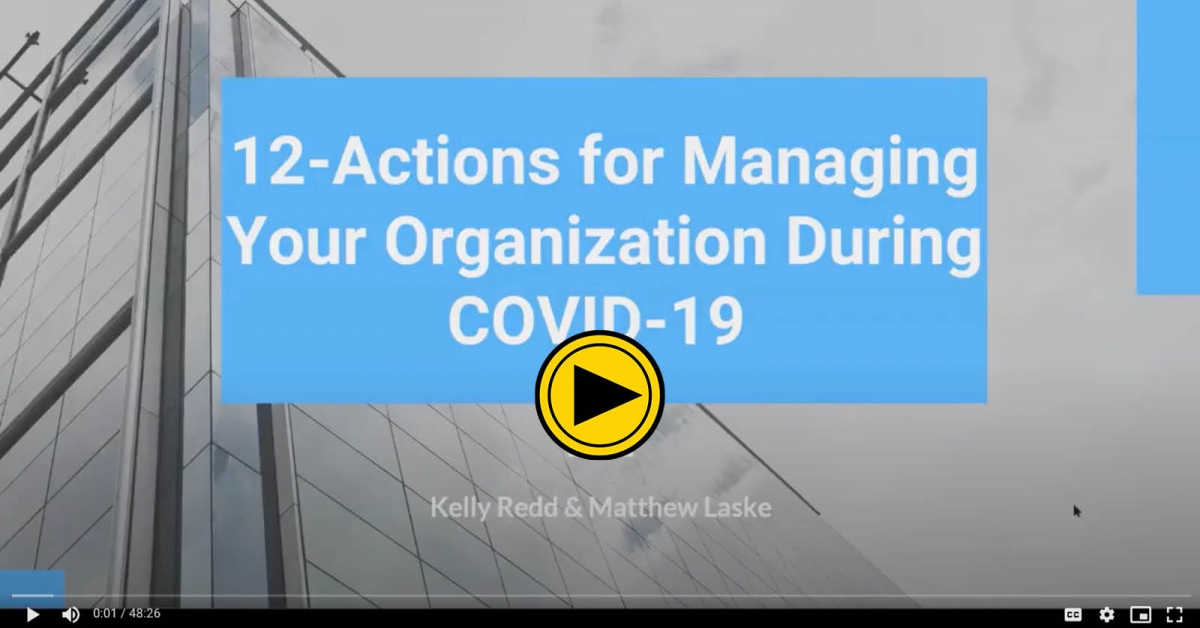Students in Appalachian State University's Industrial-Organizational Psychology and Human Resource Management (IOHRM) program are considering lessons learned from essential line workers during the COVID-19 pandemic and offering suggestions about processes and procedures for employees returning to the workplace, as America plans to re-open the economy.
In the fifth and final video in the HRM Solutions to COVID series — 12 Actions for Managing Your Organization During COVID-19 — students Kelly Redd and Matthew Laske suggest that managers should use an iterative process, listening and revising their procedures continuously, based on changing information and guidance.
The video includes interviews with HR managers who are dealing with COVID-19 issues and suggestions for dealing with social distancing norm violators — employees who disregard social distancing either at work or during their off hours, behaviors that put employees working in close proximity at risk — and handling misperceptions about non-essential workers.
The students discuss challenges, and offer solutions, for HR issues for front-line employees, including:
- Shift changes create more challenges (2:35).
- Conflict amongst peers (7:10).
- Conflict between essential and non-essential workers (9:52).
- And policy and procedure changes failing (12:37).
Review the frontline recommendations summary at 15:27.
The students also offer solutions to global HR challenges, including:
- Different responses per country and plant closures (18:04).
- Shifting to remote work – balance business and safety (21:02).
- And expatriate evacuation (22:27).
Review the global HR challenges recommendations summary at 26:58.
Finally, the students offer solutions to safety and manager challenges, including:
- Separating home from work life for a remote worker (27:56 ).
- Getting participation in Employee Assistance Programs (29:50).
- Limited face-to-face interaction creates challenges for managing safety (32:30).
- And COVID-19 increasing workplace risk/hazards (34:12).
Review the safety and manager recommendations summary at 36:14.
The students also overview different countries responses to COVID-19 (37:52) and offer a 12-action item checklist for managers (37:20).
In the first HRM Solutions to COVID video, students offered guidance to address human resource (HR) concerns for hospitals as they work to effectively staff hospitals during the pandemic. Watch the first video.
In the second HRM Solutions to COVID video, students addressed key questions facing managers across the country during the COVID-19 pandemic. Watch the second video.
In the third HRM Solutions to COVID video, students considered how the field of human resources may help the manufacturing industry survive the COVID-19 pandemic. Watch the third video.
In the fourth HRM Solutions to COVID video, students presented an HR case study on one struggling organization during COVID-19. Watch the fourth video. Watch the fourth video.
About Appalachian's IOHRM Program
Appalachian's Industrial-Organizational Psychology and Human Resource Management (IOHRM) program offers an interdisciplinary Master of Arts degree through the Departments of Psychology in the College of Arts & Sciences and Management in the Walker College of Business. Students receive specialized training in human resource management with emphases on developing knowledge of theories, methods and research findings derived from the behavioral sciences. The degree prepares graduates for work in business, industry and government, where they will address organizational activities such as selection, placement and motivation of employees, training and development, performance appraisal, and development and change of organizations. Learn more online, iohrm.appstate.edu.


